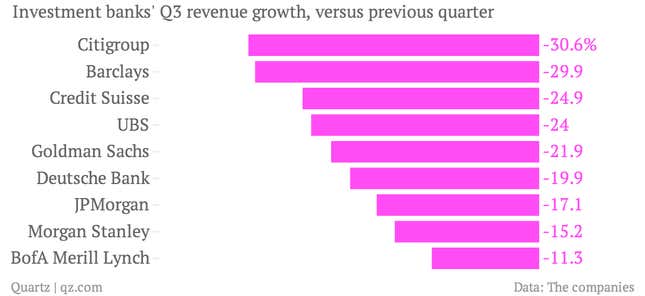
Barclays was the last big investment bank to report its third quarter results on Oct. 30. Along with the legal disclosures that are now routine, the bank suffered from the same trading turmoil as its rivals. The Federal Reserve’s decision not to taper its US bond purchases caught many in the markets by surprise last month, which dented the big banks’ bond-trading businesses and dragged down earnings across the board (see chart above).
In conference calls with analysts, bank bosses gave a variety of explanations for their third-quarter travails. Below is the pile of spin about what it meant to have a bad quarter as an investment banker.
Blame Ben Bernanke
“We are seeing sort of a one-quarter dip in performance, driven, I think, by some very specific views that the market had on the comments that the Fed made on tapering.” – Barclays CEO Anthony Jenkins, Oct. 30
“The reaction in some of the markets to future prospects of Fed tapering was significant declines in some emerging markets, equity markets, as well as in their foreign exchange.” – UBS CFO Thomas Naratil, Oct. 29
“Revenues declined from the previous year driven by decline in fixed income where market uncertainty around the timing of US monetary policy changes resulted in significantly lower client trading volumes.” – Credit Suisse CFO David Mathers, Oct. 24
Blame a bit of everything
“Sales and trading revenue was… once again impacted by concerns regarding the Fed’s position on its stimulus program as well as political uncertainty both domestically and abroad.” – Bank of America Merrill Lynch CFO Bruce Thompson, Oct. 16
“The recent quarter reflected a general slowdown in client activity, exacerbated by uncertainty around the timing of Fed tapering, the pending government shutdown and other geopolitical events.” – Citigroup CFO John Gerspach, Oct. 16
“Industry volumes were lower in the third quarter just with the overall market tone and seasonality.” – Morgan Stanley CFO Ruth Porat, Oct. 18
“We came into the summer with less certainty around monetary policy. And then there were events in the Middle East, and then, of course, people actually couldn’t get data with the government shutdown. So I think there could be something in that.” – Goldman Sachs CFO Harvey Schwartz, Oct. 17
Nothing to see here
“We’re not that terribly concerned from a business model standpoint, but yes, volumes coming back at some point would be helpful.” – Deutsche Bank co-CEO Anshu Jain, Oct. 29
“We operate in violent and volatile businesses around the world, markets go up and down.” – JPMorgan CEO Jamie Dimon, Oct. 11